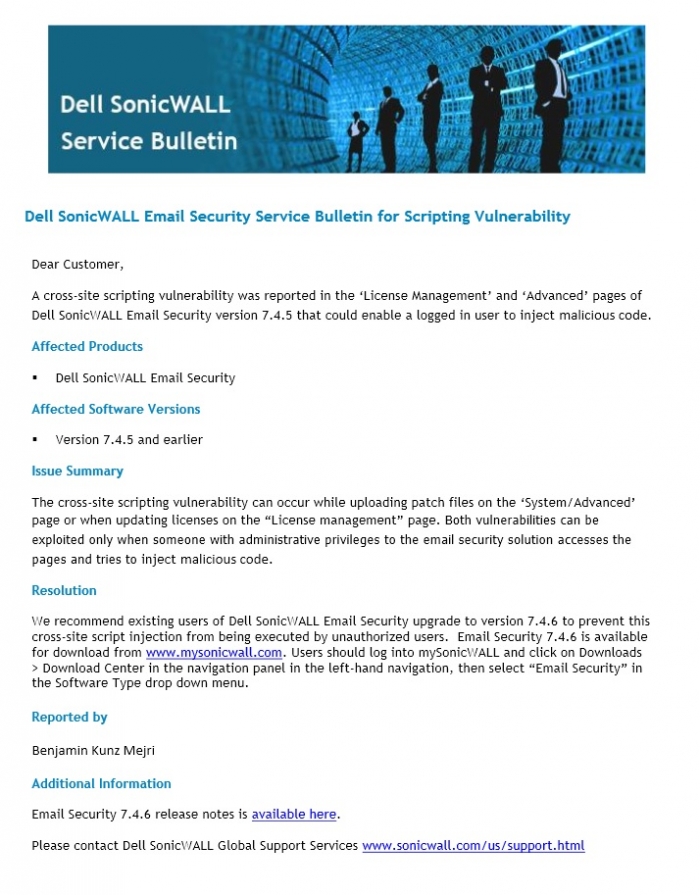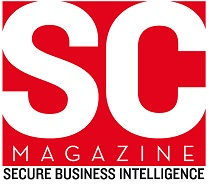Dell SonicWALL Email Security 7.4.5 Cross-Site Scripting Vulnerability (ES746)

Dell SonicWALL Email Security version 7.4.5 cross-site scripting vulnerability
Multiple persistent input validation web vulnerabilities has been discovered in the official Dell SonicWall EMail Security Appliance v7.4.6 Web-Application.
The vulnerability allows remote attackers or low privileged user accounts to inject own malicious script codes via POST method request to compromise the application or user session data/information. The SonicWALL Email Security Virtual Appliance provides the same powerful protection as a traditional SonicWALL Email Security appliance, only in a virtual form, to optimize utilization, ease migration and reduce capital costs.
Advisory Title:
Dell SonicWall EMail Security 7.4.5 - Multiple Vulnerabilities
Release Date:
2014-03-26
Vulnerability Laboratory ID (VL-ID):
1191
Common Vulnerability Scoring System:
3.5
Product & Service Introduction:
While most businesses now have some type of anti-spam protection, many must deal with cumbersome management, frustrated users, inflexible solutions, and a higher-than-expected total cost of ownership. SonicWALL® Email Security can help. Elegantly simple to deploy, manage and use, award-winning SonicWALL Email Security solutions employ a variety of proven and patented technology designed to block spam and other threats effectively, easily and economically. With innovative protection techniques for both inbound and outbound email plus unique management tools, the Email Security platform delivers superior email protection today—while standing ready to stop the new attacks of tomorrow.SonicWALL Email Security can be flexibly deployed as a SonicWALL Email Security Appliance, as a software application on a third party Windows® server, or as a SonicWALL Email Security Virtual Appliance in a VMW® environment. The SonicWALL Email Security Virtual Appliance provides the same powerful protection as a traditional SonicWALL Email Security appliance, only in a virtual form, to optimize utilization, ease migration and reduce capital costs.(Copy of the Vendor Homepage: http://www.sonicwall.com/us/products/Anti-Spam_Email_Security.html)
Abstract Advisory Information:
The Vulnerability Laboratory Research Team discovered multiple persistent input validation vulnerabilities in the official Dell SonicWall EMail Security Appliance v7.4.6 Web-Application.
Vulnerability Disclosure Timeline:
2014-02-07: Researcher Notification & Coordination (Benjamin Kunz Mejri)
2014-02-08: Vendor Notification (Dell Security Team)
2014-02-14: Vendor Response/Feedback (Dell Security Team)
2014-03-25: Vendor Fix/Patch (SonicWall Developer Team)
2014-03-26: Public Disclosure (Vulnerability Laboratory)
Discovery Status:
Published
Affected Product(s):
DELL SonicWall
Product: EMail Security Appliance Application 7.4.5.1393
Exploitation Technique:
Remote
Security Level:
Medium
Technical Details & Description:
Multiple persistent input validation web vulnerabilities has been discovered in the official Dell SonicWall EMail Security Appliance v7.4.6 Web-Application. The vulnerability allows remote attackers or low privileged user accounts to inject own malicious script codes via POST method request to compromise the application or user session data/information. The first vulnerability is located in the `filename` value of the `settings_advanced.html` file. Remote attackers and low privileged application user accounts are able to inject own malicious script codes to the application-side of the `Advanced Settings - Patch hochladen > Patch-Datei` module. Attackers can manipulate the file upload POST method request by tampering the session. Next to tampering the session the attacker exchange the file name with a malicious script code as payload. In the next step the website reloads the next firmware upgrade page (wait.html) with the file details. The execute of the injected script code via POST method request occurs at the location of the listed file name value. The security risk of the persistent validation web vulnerability is estimated as medium with a cvss (common vulnerability scoring system) count of 3.5(-). The second vulnerability is located in the file name value of the settings_upload_dlicense.html file. Remote attackers and low privileged application user accounts are able to inject own malicious script codes to the application-side of the Lizenz Verwaltung - Lizenzen Upload module. The request method is POST and the attack vector is persistent. The execute occurs in the exception context of the license update page module. The security risk of the persistent validation web vulnerability is estimated as medium with a cvss (common vulnerability scoring system) count of 3.0(+).Exploitation of both vulnerabilities requires to bypass the regular validation of the web application appliance. To bypass the filter remote attackers can inject two payloads with a split in the middle. The validation encodes the first injected payload and the second after the split executes the code. Exploitation of the remote web vulnerabilities requires a privileged user account without user interaction or a remote user with medium to high user interaction. Successful exploitation of the persistent web vulnerabilities results in session hijacking, persistent external redirects, persistent phishing and persistent manipulation of vulnerable connected or affected modules.
Request Method:
[+] POST
Vulnerable Module:
[+] Advanced Settings - Patch hochladen > Patch-Datei (settings_advanced.html)
[+] Lizenz Verwaltung - Lizenzen Upload > (settings_upload_dlicense.html)
Vulnerable Parameter(s):
[+] file name
Affected Module(s):
[+] Firmware Update - Waiting Page (wait.html)
[+] License Update Page (exception)
Affected Version(s):
[+] 7.4.6
Affected Appliance Model(s):
[+] Dell SonicWall EMail Security Appliance Web Application - All Models
Solution - Fix & Patch:
Both vulnerabilities can be patched by a secure parse and encode of the file name value in the 2 affected upload POST method requests.Filter and encode also in the wait.html and license exception the vulnerable output values even if the input is still parsed.
SonicWall Solution:
We recommend existing users of Dell SonicWALL Email Security upgrade to version 7.4.6 to prevent this cross-site script injection from being executed by unauthorized users.Email Security 7.4.6 is available for download from www.mysonicwall.com. Users should log into mySonicWALL and click on Downloads > Download Center in thenavigation panelin the left-hand navigation, then select “Email Security” in the Software Type drop down menu.
Security Risk:
The security risk of the persistent and non persistent post inject web vulnerabilities are estimated as medium.



Add new comment